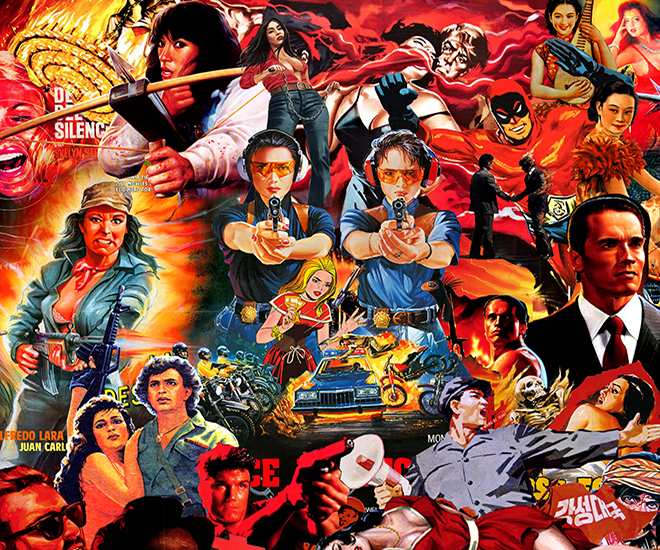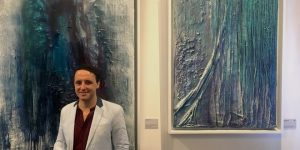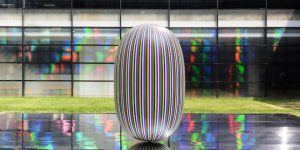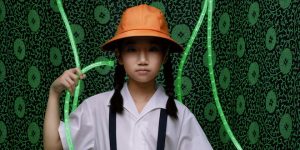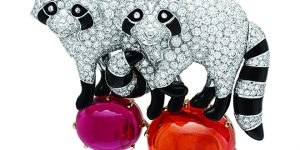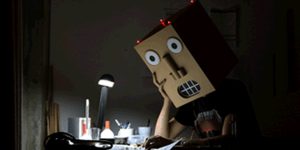Exhibitions around Singapore: 3 additions to The National Museum of Singapore
The museum presents works by Suzann Victor, teamLab, and Robert Zhao in commemoration of its 130th anniversary

‘Story of the Forest’ by teamLab. (Photo courtesy of teamLab)
Three new works were unveiled at the National Museum of Singapore in December, just in time for its 130th birthday in 2017. Director Angelita Teo says, “It’s a big celebration for us and we wanted to engage with the contemporary world and represent our history in a way that would get people excited about it.”
The new additions to the museum, Suzann Victor’s ‘Wings of a Rich Maneuver’, teamLab’s ‘Story of the Forest’ and Robert Zhao’s ‘Singapore – Very Old Tree’, are in line with the museum’s mission to “adopt cutting-edge and multi-perspective ways of presenting history and culture to redefine conventional museum experience”. The works will provide visitors with interesting perspectives to understand and appreciate Singapore’s history for years to come.
Suzann Victor

‘Wings of a Rich Maneuver’, Suzann Victor, at the National Museum of Singapore. (Photo courtesy of Chin Fan)
Suzann Victor worked on a new chandelier for the contemporary wing of the museum. ‘Wings of a Rich Maneuver’ builds on ‘Contours of a Rich Maneuver’, a beloved 12-piece red chandelier that has been at the museum since it reopened in 2006. Talking about the two works, Victor says, “The original work was about using the chandelier as a signifier of Western culture. It is really about disturbing the signification of objects like it. The ‘Rich’ is not about any form of wealth, but rather, references the kinetic element of the work in a roundabout way.”
‘Wings of a Rich Maneuver’ is a row of eight moving bespoke chandeliers constructed from Swarovski crystals and steel, illuminated by LED light. Swarovski collaborates with artists from all over the world, and are known to give free rein to collaborators to push the boundaries of what the crystals can create. In Victor’s artwork, the movement of the crystals make for a dynamic spectacle that looks different in the sunlight that streams into the glass structure in the day, and in the lights at night in equally dazzling displays.
While some things remain the same between the two works, there are significant changes. “It will be the same amplitude, for example – these things are retained,” says Victor, “But what would be quite different is the shimmering and the cloud-like light. And the light is not emitting from each lightbulb in the chandelier but from thousands of refractions of light as they travel through the crystals.”
The refractions come about from the artist’s enduring fascination with light in her work. “The rainbow refraction is a continuation of part of my work, and is about our love affair with light as a human race.” Victor had previously presented ‘Rainbow Circle’ for Singapore Biennale 2013, where she created natural rainbows indoors using sunlight, water droplets and a heliostat within the main Rotunda.
In making ‘Wings of a Rich Maneuver’, the artist paid attention to its permanent residence. “The artefacts in a history museum represents time at a standstill because it pauses time,” says Victor, “‘Wings’ continues the intention of the original series to visualise the passage of time, simply because each chandelier functions as a pendulum that work like an upside-down metronome. It actually shows us the moment to moment passing of time. And you contrast it to the function of this museum, where all the historical artefacts embody the stillness of time or time being artificially stopped to prevent the ravages of time on the object.”
teamLab

‘Story of the Forest’ by teamLab. (Photo courtesy of teamLab)
Nearby in the Glass Rotunda, teamLab has created ‘Story of the Forest’, based on the museum’s prized William Farquhar Collection of Natural History Drawings, comprising 477 drawings on paper that are showcased at the museum’s Goh Seng Choo gallery. teamLab sieved through the collection to select 69 drawings for its commissioned artwork.
The digital installation begins in the Upper Rotunda, where flowers such as the hibiscus and lotus cascade soothingly from the ceiling down along the walls. Continuing along The Passage, a winding road of 170 metres, visitors will encounter a luxuriant Malayan jungle as reimagined by teamLab, meeting animals such as the Malayan tapir and the slow loris. Iman Ismail, Assistant Curator at National Museum of Singapore notes, “Every visit is different because the digital projections run through an algorithm.” To interact with the installation, visitors can download the mobile app ‘Story of the Forest’, to capture and save all of the animals in the installation, and be rewarded with educational behind-the-scenes information on the drawings that inspired the animations.
Bidding farewell to the tropical landscape, the Lower Rotunda brings another magical visual treat with the blooming of native flowers such as the palmyra palm and the lotus flower, as well as the harvesting of fruits such as the mangosteen and rambutan. In a media conference, Toshiyuki Inoko, founder of teamLab spoke about the everlasting allure of Farquhar’s drawings. “The drawings are pure love,” says Inoko, “There are creative and scientific values. There is the romance of the history and the beauty of nature and the hope of the future from the drawings.”
Robert Zhao

‘Very Old Tree – Mangosteen Tree, Old Kallang Airport (detailed view), 2015, Robert Zhao. Collection of the National Museum of Singapore.
Leaving teamLab’s digitally animated world, visitors will come upon Robert Zhao’s ‘Singapore, Very Old Tree’ series depicting trees – and people – from around Singapore. The static but no less impactful images provide a change of pace before one enters the Singapore History Gallery. The work, comprising 30 images, was commissioned for Singapore’s Golden Jubilee in 2015, and acquired in 2016 by the National Museum – 17 are on display.
“It started as a postcard from the National Archives of Singapore. Just a picture of a very big tree and a small man. And the title was ‘Singapore, Very Old Tree’. That postcard made me think about trees around Singapore that are really, really old,” says Zhao, “The man is there to give scale to the tree, and it made me think that there are stories that the trees can tell and you need a person to tell them. The stories about trees in Singapore can be a greater story about Singapore.”
Zhao points out that in some of the pictures, such as ‘Bodhi Tree, Bidadari Cemetry’ and ‘Sea Beam, Stamford Road’, the trees photographed are surrounded by construction, a familiar sight in Singapore, and calls them “silent witnesses to history”. One of the pictures in the series is taken at the Old Kallang Airport area near Goodman Road. The story of the tree is told by Ramanathan, a 70-year-old odd-job labourer who has made the tree his hangout spot since he saved it from being cleared some twenty years ago. The picture shows the man’s bicycle, and some plastic chairs for passers-by to sit with him.
Not all the trees are “witnesses” to unhappy events. ‘The Wedding Tree, Seletar Reservoir’ shows the bald casuarina tree that features often in Singaporean couples’ wedding photographs. Wong Yong Choon, a photographer speaks of how he has personally shot over 100 couples at the photogenic tree, which is flanked symmetrically by two benches against an open, green landscape.
*For more information, visit www.nationalmuseum.sg.
This article was first published in Art Republik.
